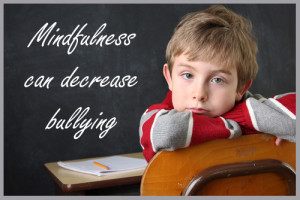 You may be surprised to learn that mindfulness can reduce bullying both in school and at home. Mindfulness can help children and adults become more focused, more relaxed and in many cases happier. This is because the practice of mindfulness creates new neuropathways in the brain. That is what some scientists claim, and thousands of people who practice mindfulness on a daily basis agree with these experts.
You may be surprised to learn that mindfulness can reduce bullying both in school and at home. Mindfulness can help children and adults become more focused, more relaxed and in many cases happier. This is because the practice of mindfulness creates new neuropathways in the brain. That is what some scientists claim, and thousands of people who practice mindfulness on a daily basis agree with these experts.
You see, the practice of mindfulness is not new. It has been around for centuries. In the last two decades, scientific studies have caused mainstream media and education to take note. Educators have discovered that mindfulness can increase student test scores, help reduce bullying and cause children to be happier and more content. No wonder the practice is becoming more widespread in our public and private education systems.
Not only can mindfulness result in the above positive results, it is easy and inexpensive to implement. Does this sound too good to be true? If you said yes, you’re not alone. There are skeptics who are not yet convinced. If you find the claims hard to believe, try it for yourself. Begin practicing mindfulness in your own life on a daily basis. I suggest twenty minutes a day for six weeks as a start. After your own experience with mindfulness, re-evaluate how you feel about using the techniques to help improve the lives of children.
Would you agree that bullying is often the result of a real or perceived imbalance of power? There are many reasons why children begin bullying others or why children become victims of bullying. Some of these reasons include:
a/ being unhappy and discontented
b/ harboring anger from past incidents
c/ being abused by parents or siblings
d/ exclusion from peer groups
e/ boredom
If mindfulness techniques are introduced properly to children, they will begin to be more calm, happier and less apt to bully others. Children have described the feeling they gain from mindfulness exercises as ‘having a sense of peace’, ‘feeling more relaxed’ and ‘having their brain slowed down’.
Through the practice of mindfulness, children learn to be content in the moment and not dwell on past incidents. They worry less about being unhappy in the future and many say they can think more clearly. Children experience fewer instances of conflict with others as a result of the increased level of calm.
Are you a parent who would love to give your children the gift of clarity and calmness? Are you a teacher who longs for your class to be more focused and relaxed? As a parent and teacher myself, I can tell you I have found success with mindfulness techniques in the classroom and at home. I believe you will too.
Has mindfulness helped you or someone you know? Please share by leaving a comment below.
